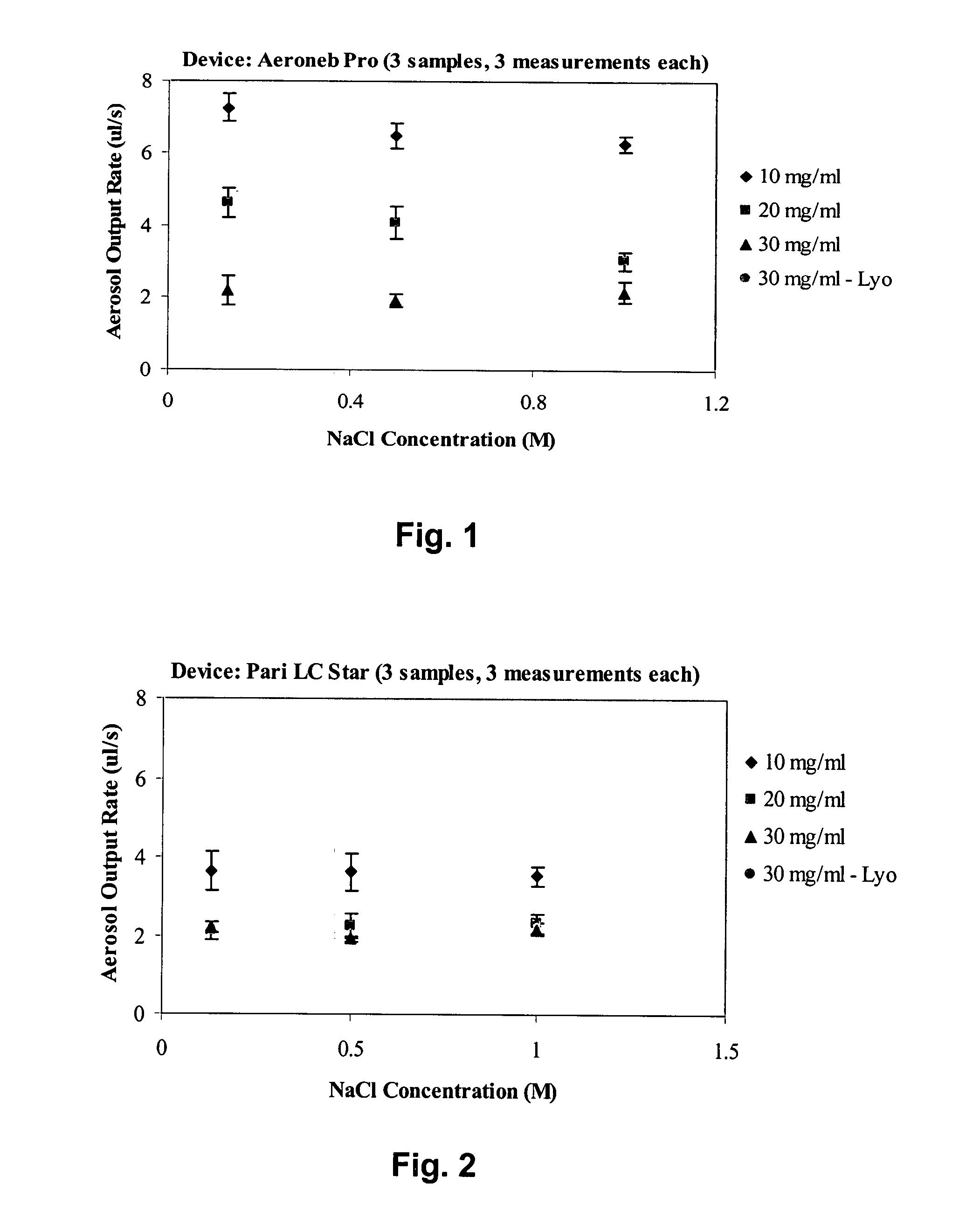Pulmonary surfactant formulations and methods for promoting mucus clearance
a technology of surfactant formulation and pulmonary surfactant, applied in the field of pharmaceuticals, can solve the problems of airway obstruction, dehydration of airway surface liquid, airway patency damage, etc., and achieve the effects of reducing inflammation, improving airway patency, and reducing airway obstruction
- Summary
- Abstract
- Description
- Claims
- Application Information
AI Technical Summary
Benefits of technology
Problems solved by technology
Method used
Image
Examples
example 1
Determination of High Molar Salt Effect on Surfactant Formulation Viscosity
[0114]Increasing concentrations of NaCl were added to pulmonary surfactant-containing solutions as described in Table 1. The buffer used in these examples was Tris (Tris Hydroxymethylaminoethane; Trisamine). In the table, “dispersion” refers to formulation prepared as i) a liquid dispersion and “lyo: refers to a formulation that was produced as a lyophilized product and then reconstituted at the time of use.
[0115]
TABLE 1Surfactant-salt solution formulations.Total PhospholipidFormulationConcentration (mg / ml)Buffer Concentration (M)nS-43100.133S-43100.53S-43101.03S-43200.133S-43200.53S-43201.03Dispersion300.133Dispersion300.53Dispersion301.03Lyo300.133Lyo300.53Lyo301.03
[0116]Each formulation was then evaluated for its apparent viscosity at 25° C. The apparent viscosities of the surfactant formulations were measured over at 25° C. using a TA AR1000 Rheometer (TA Instruments, New Castle, Del., USA) fitted with a ...
example 2
Determination of Surfactant-Salt Formulation Activity In Vitro
[0119]Each surfactant-salt solution was evaluated to determine its surface activity in vitro. Samples were diluted in 20 mM Tris-Ac / 130 mM NaCl buffer at pH 7.6, or a matching buffer: 20 mM Tris-Ac pH 7.6 containing 0.13, 0.5, or 1.0M NaCl. The results of the in vitro activity measurements are set forth in Tables 3 (20 mM Tris-Ac / 130 mM NaCl) and 4 (matching buffer). No impact of NaCl concentration on in vitro activity of the samples when diluted using 0.13 NaCl buffer was observed.
[0120]
TABLE 3Activity of samples diluted in 20mM Tris-Ac / 130 mM NaCl buffer.NaClMinimum Surface Tension at 3 mg-TPL / ml (mN / m)(n = 3)Conc.10 mg / ml20 mg / ml30 mg / ml30 mg / ml - Lyo(M)AvgSDAvgSDAvgSDAvgSD0.13001100540.5000035451.000230076
[0121]
TABLE 4Activity of samples diluted in matchingNaClMinimum Surface Tension at 3 mg-TPL / ml (mN / m)(n = 3)Conc.10 mg / ml20 mg / ml30 mg / ml30 mg / ml - Lyo(M)AvgSDAvgSDAvgSDAvgSD0.13001100540.50155104001.07412111377
example 3
Measurement of Aerosol Output Rate of Surfactant-Salt Formulations
[0122]Each surfactant-salt solution was evaluated to determine its aerosol output rate. Aerosol output rate was measured using the Aeroneb Pro vibrating mesh nebulizer, and the Pari LC Star jet nebulizer. Samples were run through each nebulizer in triplicate. The results for the Aeroneb Pro nebulizer are presented in FIG. 1, and the results for the Pari LC Star nebulizer are presented in FIG. 2.
[0123]Aerosol output rate was measured at 10 mg / ml, 20 mg / ml, and 30 mg / ml. Aerosol output rate was greatest for the 10 mg / ml sample, with a slight decrease in output rate observed for the 20 mg / ml sample relative to the 10 mg / ml sample, and a further decrease in output rate observed for the 30 mg / ml sample relative to the 10 mg / ml and 20 mg / ml samples (FIG. 1). A slight decrease in aerosol output rate was observed upon increased salt concentration for the 10 mg / ml and 20 mg / ml samples (FIG. 1). In contrast, the 30 mg / ml sample...
PUM
| Property | Measurement | Unit |
|---|---|---|
| osmolality | aaaaa | aaaaa |
| concentrations | aaaaa | aaaaa |
| concentrations | aaaaa | aaaaa |
Abstract
Description
Claims
Application Information
 Login to View More
Login to View More - R&D
- Intellectual Property
- Life Sciences
- Materials
- Tech Scout
- Unparalleled Data Quality
- Higher Quality Content
- 60% Fewer Hallucinations
Browse by: Latest US Patents, China's latest patents, Technical Efficacy Thesaurus, Application Domain, Technology Topic, Popular Technical Reports.
© 2025 PatSnap. All rights reserved.Legal|Privacy policy|Modern Slavery Act Transparency Statement|Sitemap|About US| Contact US: help@patsnap.com

